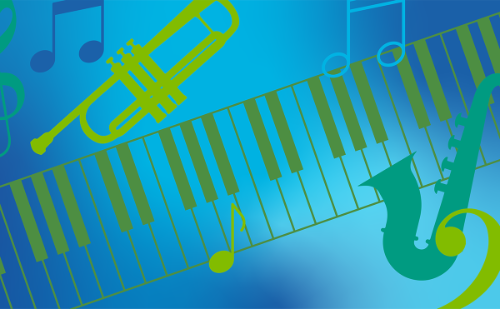Fall intake auditions will be scheduled for February. Late auditions will take place in May. Application for Jazz Studies is part of the standard Capilano University application process. All applicants will be contacted.
Auditions are required for all entrants. Specific audition requirements for each instrument can be found on this page.
Once an application has been received, the School of Performing Arts office will contact all students by email to provide details of the audition process and schedule how you will take your Theory Exam.
When filling out the application form, please include which instrument(s) you will be auditioning on in the comments section of the form.
Students applying as a transfer student should include this information in the comment section of the application form as additional challenge tests will be scheduled on the same day as the audition in piano, theory and aural skills.
*Entrance into the Jazz Studies program is competitive as seats are restricted. Applicants are ranked in comparison with others who audition on the same concentration instrument with the entrance year applied for taken into consideration. Providing that all other entrance requirements have been passed, students will be admitted in the order of their ranking until the seats available for that instrument have been filled.
Separate auditions are held for the Jazz Choirs and Jazz Ensembles.
Acceptance into the program does not guarantee acceptance into these ensembles. Students will be contacted in August with instructions to sign up for Ensembles.
Theory test
All applicants are required to demonstrate a knowledge of rudimentary music theory before gaining acceptance into the Jazz Studies Program. The entrance-level test may require applicants to:
- Identify and/or write major and minor key signatures in 12 keys
- Identify and/or write major, harmonic minor, natural minor, melodic minor, and blues scales in 12 keys
- Write and identify intervals including major/minor seconds, thirds, sixth sevenths, and perfect/diminished/augmented octaves, fifths, and fourths
- Label and/or spell chords using jazz chord symbols including dominant 7th, major 7th, minor 7th, minor 7th flat 5, diminished 7th, dominant seventh with suspended 4th
- Demonstrate a harmonic understanding of 12-bar blues by writing a chord progression
- Demonstrate an understanding of notated rhythms in the context of simple and compound time signatures
Performance audition
Applicants will submit their Audition Videos. A small panel of Jazz Studies faculty members will assess each submission. Each applicant will perform requested audition material. Applicants who demonstrate an acceptable level of musicianship and ability will be ranked competitively. A set number of first-year seats are available each year.
Transfer students
Transfer students take the same theory test and performance audition and prepare the same requirements as first-year applicants. Auditioning faculty will be informed of the students’ previous post-secondary training and may ask applicants to demonstrate more advanced technical skills. Additional testing (advanced theory, ear, and keyboard assessments) may be scheduled.
Keyboard skills
Keyboard skills are not required for students other than piano majors, but we recognize that many students who are not auditioning as pianists may have skills and training in this area. Upon demonstration of sufficient skill, a student may be given advanced placement in Keyboard Skills (Jazz 116 and JAZZ 117). For piano majors and or other musicians with advanced piano skills, these required credits are replaced with Secondary PMI credits. Please consult with the keyboard skills instructor about this in the first week of classes.
Distance auditions
If you will be submitting your theory exam virtually, it must be completed in real-time under the supervision of a suitable exam proctor. A schoolteacher or other music education professional may perform this role. An exam will be sent to the proctor and students will complete the exam under his or her supervision. The proctor then sends the completed exam to the Jazz Department. Students are responsible for any and all costs incurred in this regard. We must have this information before accepting your audition video submission.
Please note the following important points:
The Jazz Department may ask students for supplementary materials to address potential technical problems with your video submission.
If a student misses any portion of the audition process, we may choose not to reschedule.
Students are responsible for arranging their own technical requirements to facilitate their part of the audition.
Video Setting Instructions
- Recording of tunes should be in one uninterrupted take for each piece performed.
- You may use whatever video format that will allow us to clearly hear and see your performance. Typically, applicants use YouTube to post their performance online.
- Set video privacy settings to “Unlisted” and send the direct link. This way we won’t require special permission to view it, but it also won’t be public.
The audition panel must be able to clearly see and hear the student.
Tunes:
Perform with your own single accompanist or your own background recordings. Be prepared to play a jazz standard in a medium swing tempo, a second jazz standard in a contrasting feel (i.e., latin, waltz, ballad), and a 12-bar blues. All three tunes should include at least one chorus of an improvised solo. An acoustic piano, stereo system and music stand will be provided.
Technical:
- Perform a short classical etude or technical study of your choosing.
- Perform major, harmonic minor and traditional melodic minor scales, in 12 keys, ascending and descending, two octaves where possible.
- Perform arpeggios of major and minor triads and 7th chords (dom7, Maj7, min 7, min7b5, dim7) in 12 keys, ascending and descending, two octaves where possible.
- Sight-read in both classical and jazz styles.
- Sing pitches, clap rhythmic patterns and identify triad types played by the jury.
Drum Set:
- Demonstrate swing, Latin, funk, and rock styles.
- Trade 4’s (play four bars of a tune, then four bars of a drum solo, repeat).
Snare Drum:
- Perform a long roll, flam, ruff/drag, and paradiddle.
- Perform a prepared solo which includes the above rudiments.
- Sight-read patterns provided by the jury.
Tunes:
Perform using either two or four mallets, with your own bassist or your own background recordings. Be prepared to play a jazz standard in a medium swing tempo, a second jazz standard in a contrasting feel (i.e., latin, waltz, ballad), and a 12-bar blues. All three tunes must include the melody, one chorus of comping, and at least one chorus of an improvised solo. A vibraphone, stereo system and music stand will be provided.
Technical:
- Perform a short classical piece of your choosing (with four mallets if possible).
- Perform major, harmonic minor and traditional melodic minor scales in 12 keys, ascending and descending, two octaves.
- Perform arpeggios of Maj7, min7, dom7, dim7, and min7b5 chords, in 12 keys, ascending and descending, two octaves.
- Sight read a melody and chordal accompaniment (separately) with a provided lead sheet.
- Sing pitches, clap rhythmic patterns and identify triad types played by the jury.
Tunes:
Perform with your own bassist or your own background recordings. Be prepared to play a jazz standard in a medium swing tempo, a second jazz standard in a contrasting feel (i.e., latin, waltz, ballad), and a 12-bar blues. All three tunes should include at least one chorus of an improvised solo. An acoustic piano, stereo system and music stand will be provided.
Technical:
- Perform a short classical piece of your choosing.
- Perform major, harmonic minor and traditional melodic minor scales in 12 keys, ascending and descending, two octaves, hands together.
- Perform arpeggios of major and minor triads and dominant 7th chords, in 12 keys, ascending and descending, two octaves, hands together.
- Play Maj7, min7, Dom7, dim7, and min7b5 chords in 12 keys, both hands, solid inversions.
- Sight-read in both classical and jazz styles.
- Sing pitches, clap rhythmic patterns and identify triad types played by the jury.
Tunes:
Perform with your own single accompanist or with your own background recordings. Be prepared to sing a jazz standard in a medium swing tempo, a second jazz standard in a contrasting feel (i.e., latin, waltz, ballad), and a 12-bar blues. Include an improvised scat solo on at least one of your songs. An acoustic piano, stereo system and music stand will be provided.
Technical:
- Perform the three scales provided, singing numbers.
- Perform the two jazz etudes provided, using scat syllables
- Sight sing a simple melody.
- Sing pitches, clap rhythmic patterns and identify triad types played by the jury.
Download the Vocal Audition Package (pdf).
Repertoire:
Be prepared to play a jazz standard in medium swing tempo, a second standard in contrasting feel (i.e., Latin, ballad, waltz) and a 12-bar blues. Your performance of each selection will include the melody and at least one chorus of improvised solo playing. A faculty member will accompany the student for the jazz selections. The applicant should bring clear and legible sheet music for these pieces in order to facilitate this accompaniment. In addition, be prepared to perform a short classical etude of your choosing.
Technical:
- Perform major, melodic minor, and harmonic minor scales in 12 keys, two octaves, eighth notes at 100 bpm.
- Perform arpeggios of major and minor triads and 7th chords (dom7, maj7, min 7, min7b5, dim 7), two octaves in 12 keys.
- You will be asked to sight-read in jazz and classical styles.
Tunes:
Perform with the faculty guitarist provided. (You may elect to bring your own single accompanist, or your own background recordings though it is not necessary.) Be prepared to play a jazz standard in a medium swing tempo, a second jazz standard in a contrasting feel (Latin, waltz, ballad, etc.), and a 12‑bar blues. For all three tunes, be prepared to play the melody, chordal accompaniment, and an improvised solo. An amplifier, stereo system and music stand will be provided.
Technical:
- Perform a G Major scale in five locations, covering the entire range of guitar (see attached guide), as well as one-octave scales in C Major, F Major, Bb Major, Eb Major, E minor, A minor, D minor, G minor, and C minor. Be prepared to demonstrate an ability to adapt to harmonic minor and jazz melodic minor.
- Perform arpeggios of Maj7, dom7, min7, and min7b5 chords, in 12 keys, root position.
- Play Maj7, min7, dom7, and min 7b5 chords, in 12 keys, in various voicings along the neck and in “Drop 3” and “Ninth form” voicings (see attached examples in the key of C).
- Sight read a melody and play chordal accompaniment with a provided lead sheet.
- Sing pitches, clap rhythmic patterns and identify triad types played by the jury.
- Optional: Perform a short classical etude or technical study of your choosing.
*Guitarists in need of technical assistance are advised to consult: The Ronny Lee Jazz Guitar Method—Volume 2, Mel Bay Publications.
Download scales Voicings for Guitar (pdf).
Tunes
Perform with the faculty guitarist provided. (You may elect to bring your own single accompanist or your own background recordings though it is not necessary.) Be prepared to play a jazz standard in a medium swing tempo, a second jazz standard in a contrasting feel (i.e., latin, waltz, ballad), and a 12-bar blues. For all three tunes, be prepared to play the melody, an improvised solo, and a walking bass line. An amplifier, stereo system and music stand will be provided.
See an example of a walking bass-line Walking Bass Line (pdf).
Technical:
- Electric bassists perform two-octave scales in G Major, C Major, F Major, Bb Major, E minor, G minor, and A minor, and one-octave scales in Eb Major, D minor and C minor. Acoustic bassists perform two-octave scales in G Major, F Major, E minor and G minor, and one-octave scales in C Major, Bb Major, Eb Major, C minor, A minor, and D minor.
- Perform arpeggios of Maj7, dom7, min7, and min7b5 chords, in 12 keys, root position.
- Sight read a melody and play walking bass with a provided lead sheet.
- Sing pitches, clap rhythmic patterns and identify triad types played by the jury.
- Optional: Perform a short classical etude or technical study of your own choosing.


